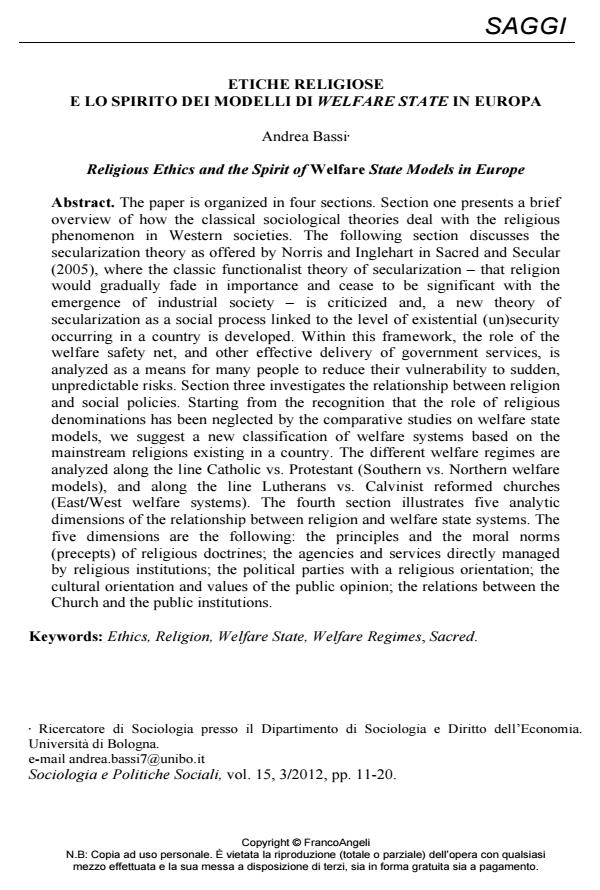Religious Ethics and the Spirit of Welfare State Models in Europe
Journal title SOCIOLOGIA E POLITICHE SOCIALI
Author/s Andrea Bassi
Publishing Year 2013 Issue 2012/3
Language Italian Pages 10 P. 11-20 File size 209 KB
DOI 10.3280/SP2012-003002
DOI is like a bar code for intellectual property: to have more infomation
click here
Below, you can see the article first page
If you want to buy this article in PDF format, you can do it, following the instructions to buy download credits

FrancoAngeli is member of Publishers International Linking Association, Inc (PILA), a not-for-profit association which run the CrossRef service enabling links to and from online scholarly content.
The paper is organized in four sections. Section one presents a brief overview of how the classical sociological theories deal with the religious phenomenon in Western societies. The following section discusses the secularization theory as offered by Norris and Inglehart in Sacred and Secular (2005), where the classic functionalist theory of secularization - that religion would gradually fade in importance and cease to be significant with the emergence of industrial society - is criticized and, a new theory of secularization as a social process linked to the level of existential (un)security occurring in a country is developed. Within this framework, the role of the welfare safety net, and other effective delivery of government services, is analyzed as a means for many people to reduce their vulnerability to sudden, unpredictable risks. Section three investigates the relationship between religion and social policies. Starting from the recognition that the role of religious denominations has been neglected by the comparative studies on welfare state models, we suggest a new classification of welfare systems based on the mainstream religions existing in a country. The different welfare regimes are analyzed along the line Catholic vs. Protestant (Southern vs. Northern welfare models), and along the line Lutherans vs. Calvinist reformed churches (East/West welfare systems). The fourth section illustrates five analytic dimensions of the relationship between religion and welfare state systems. The five dimensions are the following: the principles and the moral norms (precepts) of religious doctrines; the agencies and services directly managed by religious institutions; the political parties with a religious orientation; the cultural orientation and values of the public opinion; the relations between the Church and the public institutions.
Keywords: Ethics, Religion, Welfare State, Welfare Regimes, Sacred.
Andrea Bassi, Etiche religiose. E lo spirito dei modelli di welfare state in Europa in "SOCIOLOGIA E POLITICHE SOCIALI" 3/2012, pp 11-20, DOI: 10.3280/SP2012-003002